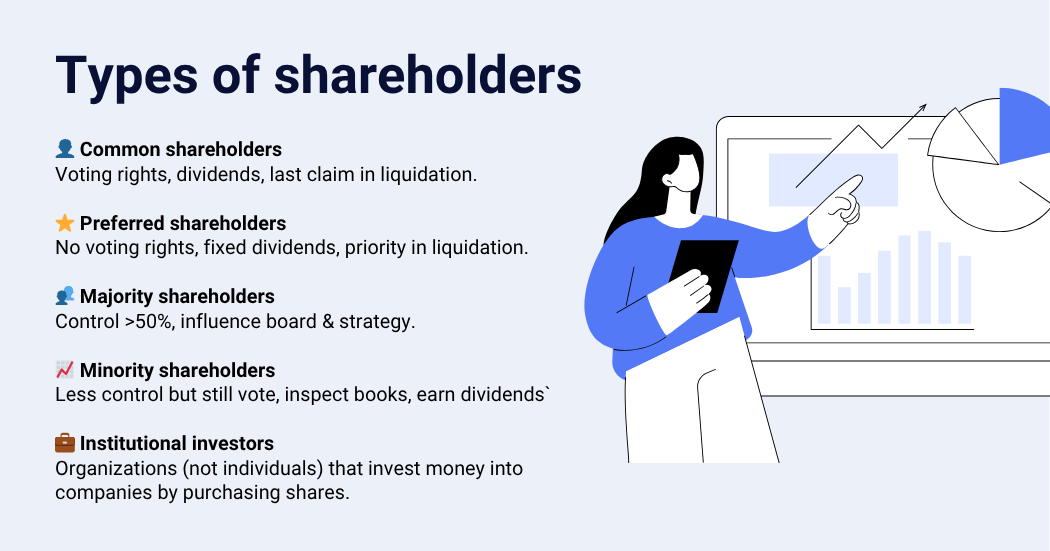ESOP in Belgium: how employee stock ownership plans work
Employee Stock Ownership Plans (ESOP) are becoming increasingly popular in Belgium, offering employees the opportunity to acquire company shares while aligning their financial interests with business growth.
But, how exactly do ESOPs work, and what are the key tax implications for both companies and employees? Corporify explains everything you need to know.
What is an ESOP?
An ESOP is a compensation scheme in which employees receive or purchase company stock in their employer’s company.
This is often done through granted stock options, which give employees the right to buy shares at a fixed strike price in the future. The goal is to enhance employee commitment, align interests with company performance, and provide financial incentives.

How do ESOPs work in practice?
Employers typically offer granted stock options under certain conditions. In some cases, a management company may be responsible for overseeing the administration of the ESOP, ensuring compliance with regulations and handling share allocations.
Employees must meet specific criteria before they can exercise their options and convert their granted share options into existing shares. These conditions can include:
- a vesting period,
- performance targets, or
- a minimum period of employment.
When employees exercise their stock options, taxation becomes a key factor in determining the net benefit.
The Belgian tax regime for ESOPs
Belgium offers a well-defined favourable tax regime for stock options, allowing employees to benefit from upfront taxation if accepted within 60 days.
Under the law of 26 March 1999, stock options are taxed at the taxable moment upon granting, provided the employee accepts them within 60 days of the offer date. If not, taxation shifts to the taxable moment when the options are granted and later exercised.
The taxable amount is calculated using a lump sum valuation, which is often significantly lower than the market value at the time of sale.
Understanding the taxable benefit of ESOPs
The financial advantage an employee gains from an ESOP is classified as a benefit in kind and is subject to progressive tax rates. As the value of shares increases, so does the potential tax burden.
Without proper planning, high earners risk moving into a higher tax bracket, reducing their net gains. To maximise benefits and avoid unnecessary taxation, strategic tax planning is essential.

Fair market value in ESOPs: how stock options are valued and taxed
The taxable value of stock options is typically determined by their market value at the time they are granted or exercised.
If the company’s stock price rises significantly, employees may face taxation on the difference between the granted price or exercise price and the stock valuation, even before the sale of their shares.
Social security contributions and ESOPs
Are all ESOP structures in Belgium subject to social security contributions?
Not always.
It depends on whether stock options are classified as part of an employee’s beneficiary’s salary slip or considered professional income. If this is the case, both the employer and the beneficiary may be required to make social security payments, which can reduce the overall financial benefit of the ESOP.
Why ESOPs are a win-win for companies and employees
For companies, ESOPs offer a way to attract and retain talent while fostering a sense of ownership among employees.
Some companies also offer additional services to help employees understand the financial and tax implications of their stock options, ensuring they maximise their benefits. A well-structured ESOP plan can:
1. Motivate employees to contribute to long-term business success.
2. Align employee interests with company growth.
3. Offer a competitive advantage in attracting talent.
4. Provide tax-efficient compensation structures.
Potential risks and downsides
Despite their benefits, ESOPs do carry some risks.
Employees may face unexpected taxation if stock options are granted under an unfavourable tax regime.
Additionally, the value of granted company shares can fluctuate, meaning employees could end up with shares worth less than anticipated. Companies must also be aware of compliance obligations to avoid tax penalties.
How to successfully implement an ESOP in Belgium
To set up a compliant and effective ESOP, companies should consider:
-
- Vesting schedules: Defining when employees can exercise their options.
-
- Exercise price: Setting a fair and strategic purchase price.
-
- Exit strategies: Establishing what happens when employees leave the company.
-
- Tax compliance: Ensuring alignment with Belgian regulations.
Seeking legal and tax advice is essential to structure an ESOP that maximises benefits while minimising tax liabilities. Many companies work with a management company to handle the administration of stock options, provide services related to compliance, and optimise the ESOP structure.
Update 04.03.2024: tax capital gains on shares: what’s changing in Belgium?
When employees sell shares granted to them, they may be subject to capital gains tax. Belgium has long been an exception in Europe, as it does not impose a general capital gains tax.
However, there are key exceptions - if the sale of shares is linked to a professional activity, the resulting capital profit may be classified as taxable income and subject to tax rates.
Now, the Belgian government is taking a significant step toward reform. As part of the solidarity contribution on financial assets, a new investment gain tax framework is being developed.
Under the current government agreement, a 10 % levy on standard investment gains on financial assets is proposed, while the existing 33 % tax on abnormal capital gains outside professional income will remain unchanged.
That said, the details of this reform remain uncertain. The exact implementation will only become clear once the legislative process is finalised.
Annual tax forms and reporting obligations
Employees participating in an ESOP must report their taxable benefit in their annual tax form, as stipulated in Article 31, second paragraph, 2° of the WIB 92 and Article 171, 3° bis of the WIB 92.
Employers, too, have reporting obligations to ensure transparency and tax compliance. Proper documentation helps prevent future legal, finance and tax issues.
Are there smart alternatives to ESOPs?
Aside from ESOPs, companies may consider other equity-based compensation plans, such as:
-
- Restricted Stock Units (RSUs): Shares granted to employees with restrictions on selling.
-
- Direct share participation: Employees purchase shares outright, sometimes at a discount.
-
- Phantom shares: A cash-based incentive linked to granted share performance.
Each alternative has different tax implications and should be assessed carefully.
How to avoid tax pitfalls in ESOPs
Want to keep ESOPs financially rewarding? Avoid common tax pitfalls by following these key steps:
-
- Understand the tax framework and how it applies to stock options.
-
- Plan for graduated tax rates to avoid higher tax burdens.
-
- Consider the impact of social security contributions.
-
- Seek professional tax and legal advice before structuring an ESOP.
Corporify, making ESOPs effortless
ESOPs align employee and company interests, but proper structuring is key to maximising benefits.
Understanding Belgian taxable benefit rules, progressive tax rates, and social security contributions ensures ESOPs remain financially rewarding and compliant.
For companies, a well-planned ESOP means ensuring compliance with the Belgian tax regime, accurately valuing stock options, and considering alternatives like RSUs. When done right, ESOPs drive engagement, financial growth, and employee retention.




